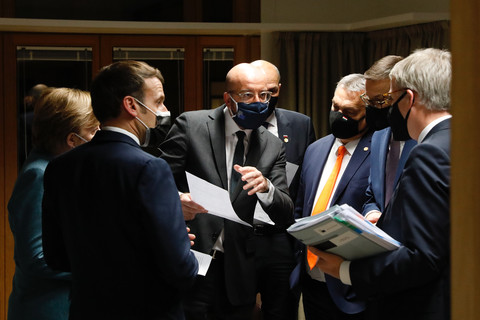[ad_1]

The EU Commission has started looking into cases of potential breaches of the respect of rule of law – which could trigger the new tool linking EU funds to such adherence, a top commission official said Wednesday (26 May).
Gert Jan Koopman, the director-general of the commission’s budget department told MEPs that exchanges with concerned member states, information-gathering, and “case-building” are expected to happen in early autumn.
“That is not yet bringing a case to the council [of member states] but an indispensable step”, he said, adding that assessment of possible cases is already well-advanced.
The new conditionality mechanism opens up the possibility of suspending EU funds if a member state breaches respect of the rule of law in a way that it endangers EU money.
Once the commission makes a proposal to suspend EU funds, then a qualified majority of member states will need to agree.
The law guiding the mechanism has been in force since January.
However, Hungary and Poland have challenged it at the EU top court. They are the two member states which pushed hard at last December’s EU summit to water down the new tool.
As a result, EU leaders last December agreed to several qualifications concerning the mechanism, one of which requires the commission to set up guidelines on how it wants to use it.
Critics say this pushes any implementation too far into the future – giving time for governments that are already accused of breaking EU rules to continue with the possible breaches.
The commission has said it wants to wait for the European Court of Justice (ECJ) ruling before publishing those guidelines. The European Parliament has recently asked the court for an expedient procedure.
MEPs in March told the commission that it should adopt guidelines to implement the new rule before 1 June, and consult MEPs on those guidelines before their approval, or else the EU executive will be sued.
Centre-right Finnish MEP Petri Sarvamaa, who lead the parliament’s team negotiating the new rule last year, said the parliament will vote on its own suggestions to the guidelines at its June plenary.
Koopman confirmed to MEPs on Wednesday evening that the commission will share its draft guidelines with MEPs in the next two weeks.
No mistakes
Koopman reiterated that no cases should be lost, and emphasised that building cases takes time.
“We simply cannot afford to make mistakes and bring cases that when they are endorsed by the council, are then annulled by the court, this would be a terrible disaster,” he said.
Koopman added that the commission needs to assess possible breaches in an “objective, rigorous, impartial and fair manner”.
The commission’s budget chief also pointed out that while the Article 7 sanctions procedure looks at rule of law in general, in the case of the conditionality mechanism a direct link has to be established with the management of EU funds.
Hungary and Poland are already under Article 7 scrutiny.
“We are looking at cases that are ongoing, serious, and that undermine the financial interest of the EU, and the trust of the citizens,” Koopman said.
But several MEPs have accused the commission of dragging its feet, and warned that the lack of action on breaches of the rule of law does in fact undermine the trust of citizens in the EU.
Liberal German MEP Moritz Körner, who was also part of the negotiating team, said he never heard of the need for guidelines while negotiating the regulation.
“This is only a way to get some more time not enforcing this regulation, and I am really worried about this situation,” he said.
Another liberal, Hungarian MEP Katalin Cseh warned that in her constituency EU funds aimed at supporting poor children’s summer camps ended up financing a lavish castle where the son of the mayor, who belongs to the ruling Fidesz party, hosts events for Instagram influencers.
“How can I explain to my voters that we still need more time?,” she asked.
[ad_2]
Source link